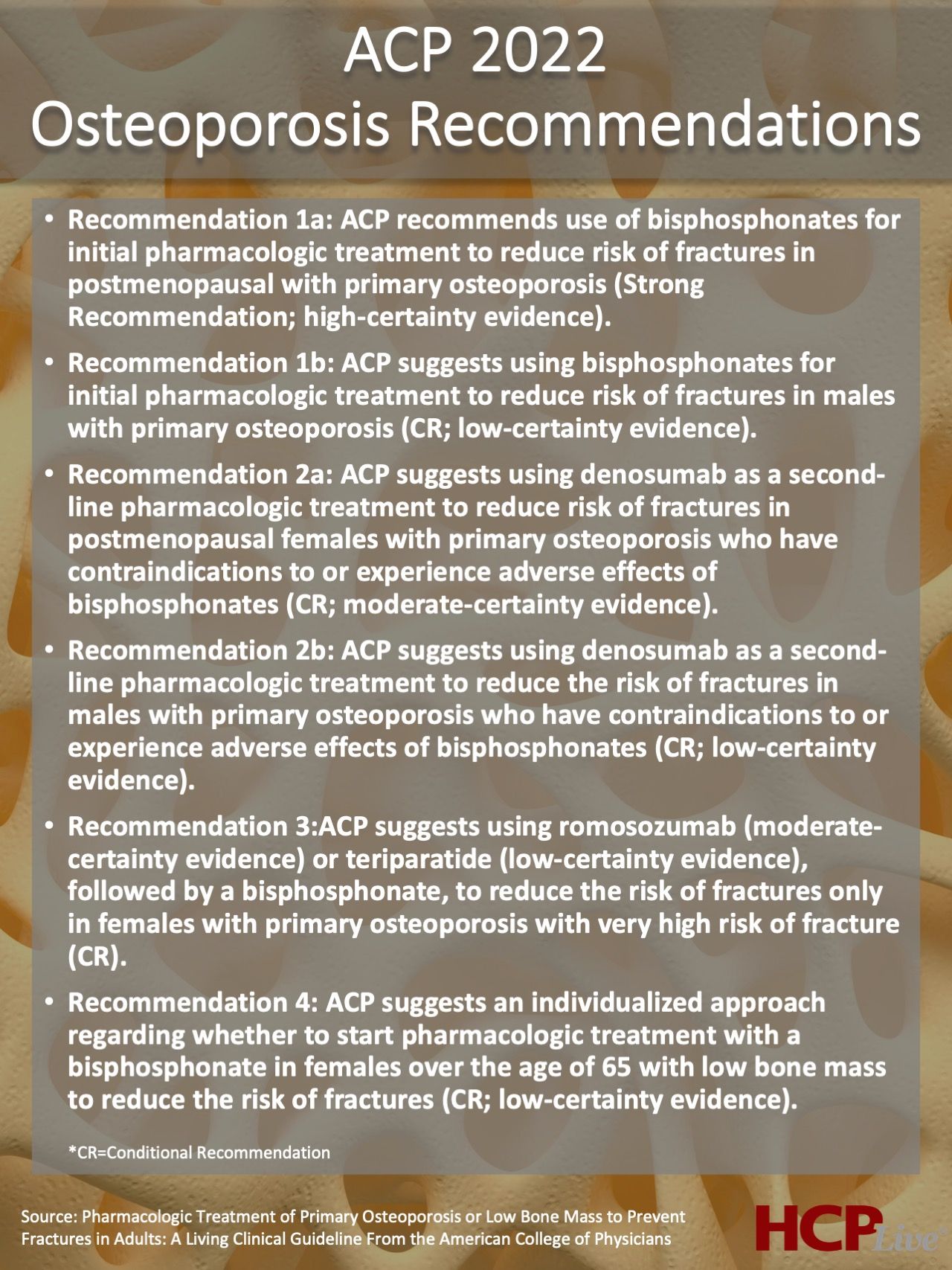Article
ACP Updates Osteoporosis Guidance, Makes Strong Endorsement for Bisphosphonates
Author(s):
Released on January 3, the American College of Physician's living osteoporosis guideline represents the organization's first update on the topic since 2017 and includes 6 specific recommendations for pharmacologic management of osteoporosis or low bone mass.
Ryan D. Mire, MD

The American College of Physicians (ACP) have released updated guidance and recommendations on the pharmacologic treatment of osteoporosis or low bone mass.
Published on January 3, the living clinical guideline, which was composed on behalf of the Clinical Guidelines Committee of the ACP, is designed for use by all clinicians and contains 6 specific recommendations, including recommending use of bisphosphonates as an initial pharmacologic treatment to reduce fracture risk in postmenopausal females as well as males diagnosed with primary osteoporosis.
“Bone fractures resulting from osteoporosis are associated with serious morbidity and mortality, and people with a history of osteoporotic bone fractures are at much higher risk of future fractures,” said Ryan D. Mire, MD, MACP, president of the ACP, in a statement. “This guideline will help clinicians determine the best course of treatment for their patients to best avoid bone fractures.”
Review of ACP's Osteoporosis Recommendations.

At 18 pages in length and citing more than 90 references, the document represents the first update on the subject from the ACP since its 2017 guidelines in osteoporosis. The document opens by outlining the 6 recommendations made within the guideline, which included 1 strong recommendation and 5 conditional recommendations. As a living document, the authors noted updates could be expected, specifically in regard to use of estrogen use as this will be reevaluated by the Clinical Guidelines Committee during the living review process. Also included in the document are a trio of figures providing summaries of the evidence base, including key outcomes and risk of adverse events, used in forming the recommendations.
To build the evidence base for the recommendation update, the ACP commissioned and funded a systematic review and meta-analysis, which was performed by a team of 6 investigators representing the ACP Center for Evidence Reviews at the Portland Veteran Affairs Research Foundation. Through a search of the Ovid MEDLINE ALL, Ovid Evidence Based Medicine Reviews: Cochrane Central Register of Controlled Trials, Cochrane Database of Systematic Reviews, and ClinicalTrials.gov from 2014 through February 2022, investigators identified 34 randomized clinical trials and 36 observational studies for inclusion in their research endeavor.
All trials included in the review and meta-analysis included adults receiving eligible interventions for low bone mass or osteoporosis, with a specific interest in randomized controlled trials for fracture outcomes and randomized clinical trials and observational studies of 1000 patients or more for harms.
In a linked editorial, Susan M. Ott, MD, of the Bone and Joint Center at the University of Washington, provided perspective on what she perceives as the strengths and weaknesses of the recommendations as well as how the results of the systematic review and meta-analysis provide information of the pitfalls of current research efforts.
“It is unfortunate that the review and recommendations do not address estrogen, one of the most effective medications to prevent osteoporotic fractures… In 1991, I reviewed all of the clinical and preclinical studies of estrogen for a conference of the Federal Drug Administration and was struck by finding that they all showed positive effects. It was the least controversial topic,” Ott wrote.
This document, “Pharmacologic Treatment of Primary Osteoporosis or Low Bone Mass to Prevent Fractures in Adults: A Living Clinical Guideline From the American College of Physicians,” was published in the Annals of Internal Medicine.




